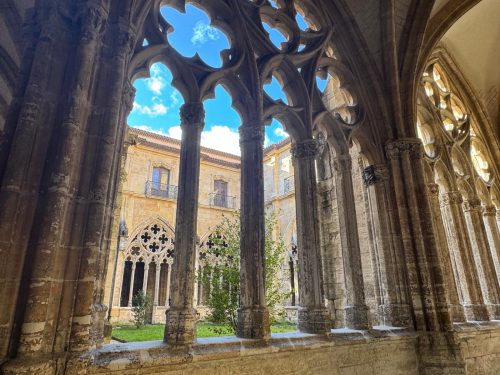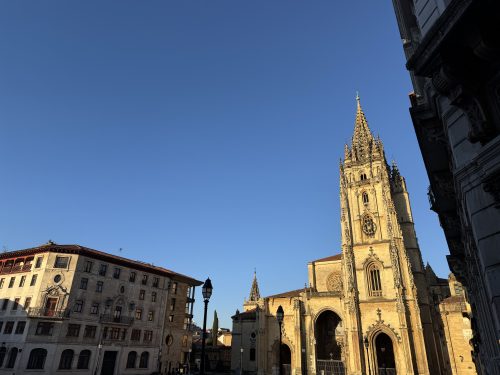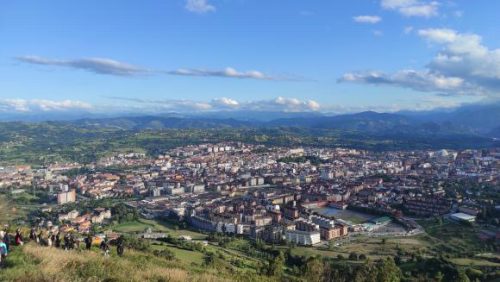
Hello everyone, my name is Louisa! I am a third year Spanish and History student, and I spent my Year Abroad studying at the University of Oviedo in Spain. I ended up learning a lot during the time I spent abroad and overall, the year was both insightful and challenging. My hope is that those who are thinking of heading to Oviedo (or even just those soon to begin their time abroad) will find this blog post useful. To that end, I’m going to write a bit about Oviedo and the setting I was in, but also more broadly I’d like to speak about some of what I have learnt during my time in Spain and the advice that I’d like to give to those in a similar position.
Oviedo, capital of Asturias.
So, as I’ve already mentioned, I went and lived in the north-west of Spain in the city of Oviedo. Oviedo is one of three main cities in Asturias and despite not actually having the largest population of those three (Gijón takes the top spot there), it is the capital of the province.
Asturias does actually have its own language – Asturian – but Castilian is more widely-spoken amongst the population. I actually really enjoyed learning more about the nuances of the Castilian spoken in Asturias, and it was mainly through conversations with local people that I learnt more about this. I was initially nervous about the quality of my Spanish, but I found that by initiating conversations, even when my nerves told me not to, I became more confident in speaking Spanish. The majority of people were really patient and helpful and that’s something I was immensely grateful for.
In Asturias, as in the rest of Spain, there were many different festivals. In the UK, we don’t really have as many of these, so to experience so many in Spain was truly incredible! My personal favourite took place a short time after my arrival and is known as San Mateo, which is one of the most important festivals to take place in Oviedo. I really do recommend looking at local events calendars, regardless of your destination, because they present an excellent opportunity to immerse yourself more in the local setting and experience something new!
Oviedo has a palpably strong connection to its past. You can stroll most of its streets and see evidence of its history in the architecture and the many statues dotted around. It is, however, a relatively small city, and so whilst I really enjoyed wandering around and exploring it, I also took a great deal of joy in stepping out of the ‘city walls’ and going a bit further. Asturias borders the Cantabrian mountains, and the mountains and hills are pretty much always visible. I’m not much of a city person, which is why I opted for Oviedo when choosing my placement location – it has a good balance of both city and nature – so I enjoyed hiking places like Mount Naranco and walking part of the Pista Finlandesa as this just provided a bit of respite from the demands of university life. In a similar way, the city of Gijón also became a bit of a refuge on occasion because, let’s face it, the Year Abroad is uniquely challenging and taking time to maintain the balance between work and life really is important.
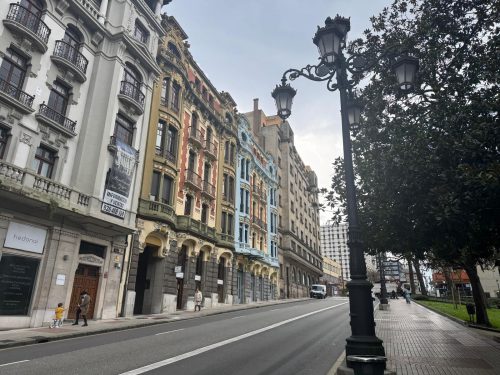
A moment for the food.
I probably could have just included this when writing about the setting, but honestly? I love my food and the food in Asturias deserves a moment of its own. Let me tell you, the Asturians know their stuff and, thanks to recommendations from locals, other students and, of course, the awesome taxi driver I met after first landing (thank you, Nacho) I can definitely offer up my top 4 things you need to try, if ever you visit.
- Fabada asturiana – this is a sort of bean stew that is widely available in Asturias. It’s slow-cooked to perfection and though versions of fabada are available in other parts of Spain, I really do love this one.
- Sidra – Asturias is famous for its cider, and for good reason. Poured from height into a small glass, you drink this sort of like a shot. It’s not as sweet as the cider you find in the UK (I actually prefer the Asturian sidra), it’s very refreshing and it’s not carbonated. I’d recommend you visit one of Calle Gascona’s many cider houses (sidrerías) to try it!
- Cachopo – another specialty of Asturias, a cachopo is essentially beef steaks (or veal) filled with ham and cheese and then breaded and fried. It’s very rich and typically comes as one large plate, so is ideally served amongst a few people, perfect for tapas!
- Carbayones – these are a cake/pastry that get their name from a great Oak tree that once stood in the centre of Oviedo. They’re filled with an almond cream and covered in a glazed sort of icing. They’re quite sweet but I did enjoy them, and I’d suggest giving them a try.
These are just my personal favourites but there’s a lot more to explore. It was important to me to try new things when I went abroad, and I did! Perhaps the most surprising thing I tried were croquetas de calamares en su tinta, or squid ink croquettes, and I ended up really enjoying them!
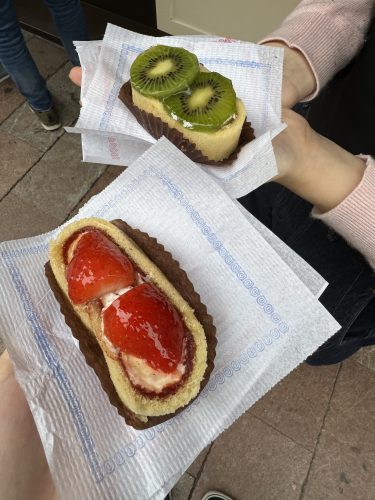
My favourite things.
Overall, I found that a lot of my favourite moments over the course of my Year Abroad were things that I sort of stumbled upon or did in an impromptu sort of way. I didn’t go as far afield or travel Spain on a grand scale. I didn’t do many wildly new activities that I’d never tried before, like surfing. Perhaps, if given the opportunity again, I would give these things a go.
Still, standing on a random street cheering on as I watched the Carnaval parades was incredible. Wandering into the local open-air market was intriguing. Watching dubbed versions of English films in the cinema was fascinating, if odd at first. I loved wandering Oviedo in the evening with friends just as much as I loved travelling to the coastal town of Llanes (which is gorgeous, by the way). It was actually by meandering down the street in search of a store to buy a notepad that I found my favourite café.
I think it’s important to go into the Year Abroad with some things you’d like to do and places you’d like to see… but don’t restrict yourself to these things. The Year Abroad is exciting but it is also immensely challenging, so if you find yourself not travelling as much as you thought you would, or as others do, that’s honestly fine. It’s your time abroad – your experience – and it’s your choice how you spend it!
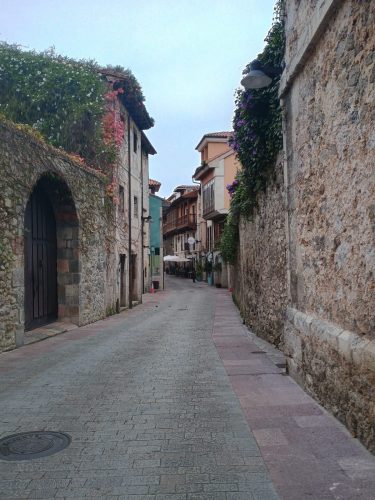
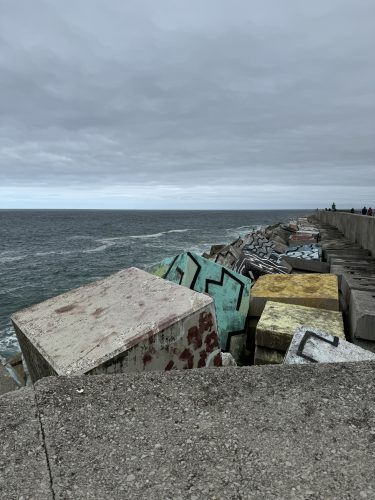
The University of Oviedo.
… took me by surprise. It is vastly different from the University of Southampton and the adjustment was tricky for me. I needed to create my own timetable (a process and a half, let me tell you) and navigate the issue of clashes myself, which meant that sometimes I couldn’t do the modules I was most looking forward to. There were far fewer assignments and most of the grade for the modules was determined by exams which was strange particularly for history because, as my fellow history students know, at Southampton we are assessed wholly through assignments. I really was pushed outside of my comfort zone, academically-speaking, and I had to adapt. It was challenging in many ways, and I think that balancing this work with my life outside of university was perhaps the thing I struggled most with over the course of my Year Abroad.
The best advice I can give is to be ready to embrace a new system and stay organised with your dates and planning. If you struggle with it all, don’t be too disheartened. Those first few weeks will be tough but if you come prepared to open yourself up to something new, you’ll hopefully get the hang of it all a bit quicker.
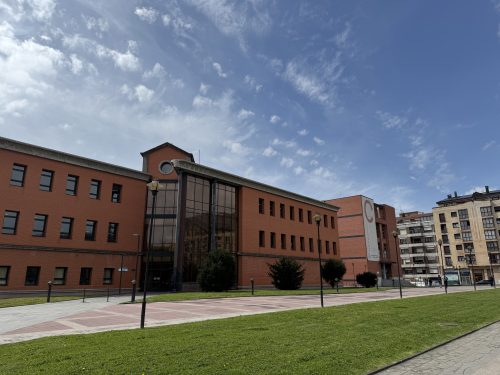
The Challenging Parts.
I think that, so far, I have cast my Year Abroad in a very positive light and deservedly so, because looking back on it now I can see just how much I’ve learnt and how much I cherish my time spent in Spain.
However, as the Spanish say, no todo es de color de rosa, and you need to be prepared for some of your expectations not to be met. Does this mean you should view your Year Abroad as a sentence yet to be served? Absolutely not, it just means you need to be realistic when you are getting ready to go abroad. Some of the things I found most challenging were expected, some were a complete curveball; all of them have helped me to become more adaptable and confident as an individual though, so the challenging things you face may be equally rewarding for you, just not in the way you envisioned! 🙂 I’ll list some of my examples…
- Visa and TIE process – annoying but expected. I knew this was going to be tricky to navigate but I definitely underestimated it all and almost did not apply for my TIE in time. Would not recommend leaving these processes for later. I would, however, suggest being clear on the legal requirements for your stay well in advance and making sure you prepare as much as you can before you arrive in Spain, particularly in the case of the TIE.
- Being told by the lady at the train station on my third day in Spain that I needed to go to the tattoo and piercing shop to buy a train ticket to the shopping centre – yeah, can’t say I saw that one coming and I ended up just getting the bus and left that particular challenge for another day. Outcome? I ended up knowing the bus system off by heart and still learnt what she actually meant a bit further into my year.
- Correos – potentially my nemesis? I ran out of English teabags (an obvious emergency) and hadn’t seen any in the shops (Mercadona, please just head to Mercadona) so I decided to order some from the UK. In hindsight, I really could not tell you why. A month and a half later, and the day I was heading back to the UK for Christmas, they arrived, and that was after me having to ask the receptionist at my student accommodation if she’d help me because I needed someone with a DNI (Spanish national identity document) to receive the package for me. What did I learn? To pack plenty of teabags. In all seriousness, I did have a certain newfound confidence after dealing with Correos – I think everyone does.
- The modules in Spanish – challenging and perhaps a little more so than I expected. My first history class in Spain, the professor was detailing complex demographical and geographical information regarding Early Modern Europe. The vocabulary was largely unfamiliar, and he spoke very quickly. I can safely say that I left that room questioning my own audacity at heading abroad in the first place. In reality though, I adapted to this within 2-3 weeks, improved my Spanish a lot, and ended up really enjoying this module, though I don’t normally study the history it covers. It just goes to show that we’re actually more adaptable than we give ourselves credit for and are more than capable of successfully completing the year.
There were, overall, a lot of things I did find challenging and these are just some that have really stuck with me. On reflection I truly do just think it’s funny how unexpected and random these things can be. Except for Correos… Correos is no laughing matter.
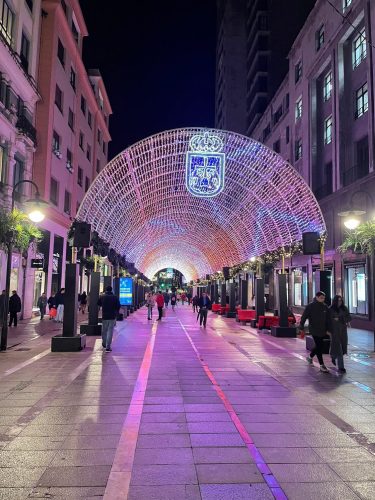
Parting Advice and End of this Lengthy Blog.
I wanted to do a Year Abroad because I wanted to challenge myself with something new that I thought would be a rewarding experience. I had never been to Spain, had never been on a plane and the last time I went abroad was for a school day trip to France in Year 7. I’m quite an independent person but I hadn’t really explored much and I thought this would be a good chance to do so whilst also experiencing firsthand a culture and language that I have studied for 10 years.
It was worth it. There were a lot of challenges and a lot of ups and downs but I’m proud of that year I spent in Spain. I came away from it afterwards having met and made friends with people from all over the world, who I am still in contact with today. My Spanish has improved and I am more competent as a historian and as an individual. I created my own sort of home in Oviedo, even if there were moments when I was just saying ‘take me back to England’.
Be intentional in the way you approach your time abroad and think about how you can make the most of it… but also embrace the challenges and do your best to face them and I think you’ll walk away from those, too, having learnt something. I’m glad I did my Year Abroad in Oviedo, and it’s encouraged me to live abroad in the future and to explore more in general.
I wish the best of luck to all you people that are going abroad,
Louisa 🙂
